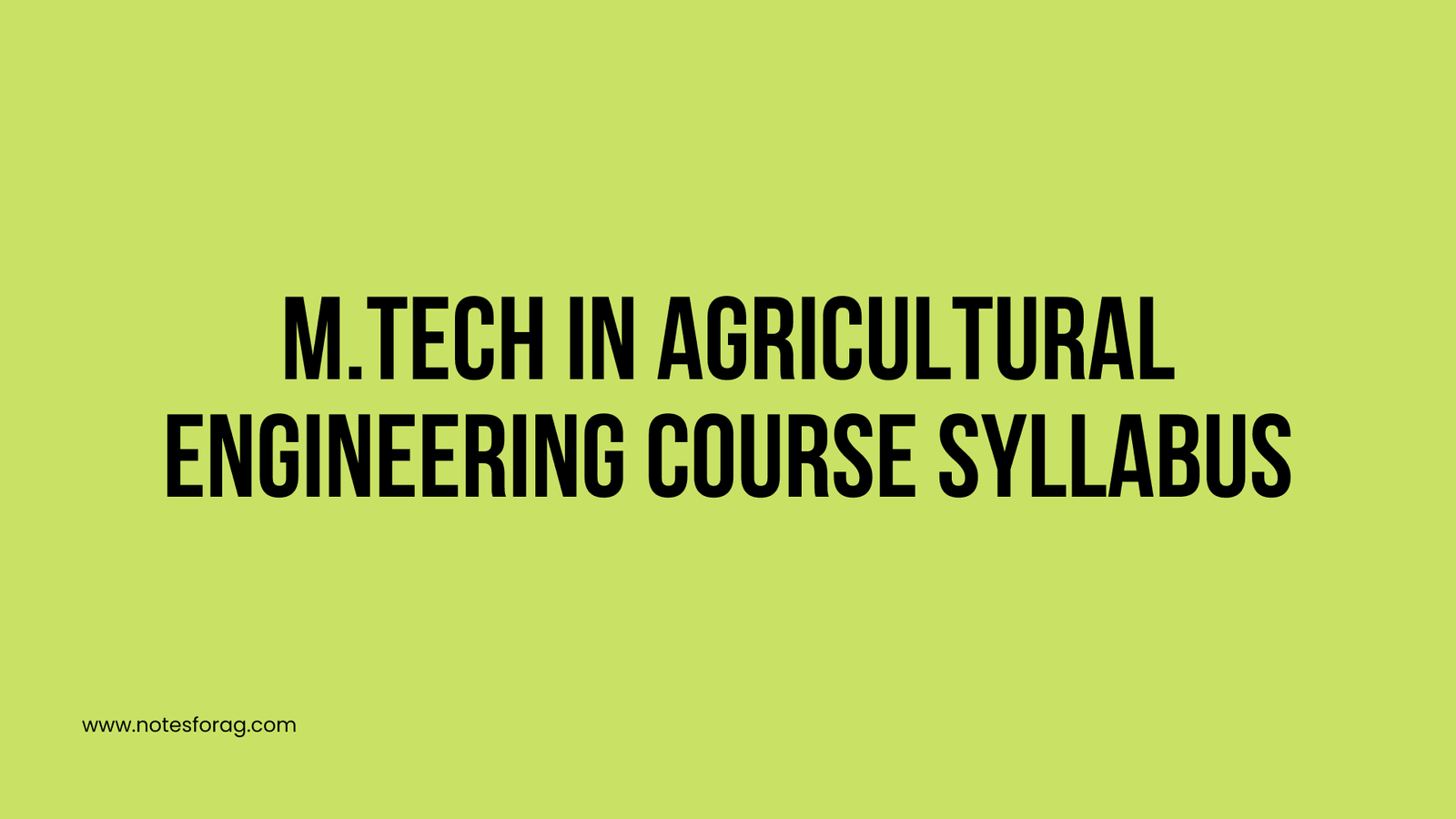The M.Tech in Agricultural Engineering in India is a two-year postgraduate program designed to deepen students’ understanding of advanced agricultural technologies and sustainable farming practices. The syllabus typically includes core subjects such as Farm Machinery and Power, Soil and Water Conservation Engineering, Irrigation and Drainage Systems, Agricultural Process Engineering, and Renewable Energy in Agriculture. These courses blend principles from mechanical, civil, and chemical engineering to address challenges in food production, post-harvest processing, and resource management. Practical training, industrial visits, and research projects are integral, ensuring students gain hands-on experience with modern tools and techniques used in Indian agriculture.
In the Indian context, this program is especially relevant due to the country’s agrarian economy and the pressing need for innovation in farming systems. With increasing concerns over climate change, water scarcity, and food security, the syllabus also emphasizes precision agriculture, GIS and remote sensing, and sustainable energy solutions tailored to rural settings. Graduates are equipped to contribute to government initiatives like PM-KUSUM and the National Mission on Sustainable Agriculture, or to work with agri-tech startups and research institutions focused on improving productivity and livelihoods in India’s diverse agro-climatic zones.
What is M.Tech in Agricultural Engineering?
M.Tech in Agriculture Engineering is a master’s degree that includes various topics such as plant breeding and genetics, agronomy and soil science, seed science and technology, plant pathology, and agricultural meteorology.
The course helps them to understand the nature and impact of farming on the environment.
The main objectives of M.Tech in Agricultural Engineering are
To provide a comprehensive and application-oriented education in Agricultural Engineering, the M.Tech program in India is structured with several key objectives:
- To develop advanced technical skills in designing, operating, and managing agricultural machinery, irrigation systems, and post-harvest technologies suitable for Indian farming conditions.
- To foster innovation and research in emerging areas like precision agriculture, renewable energy, and sustainable water management for enhancing rural livelihoods.
- To equip students with problem-solving abilities for addressing pressing issues such as land degradation, climate variability, and low farm productivity.
- To contribute to national goals like food security, sustainable agriculture, and income enhancement for farmers through engineering-based interventions.
- To promote interdisciplinary integration of engineering principles with agricultural sciences to generate context-specific solutions.
- To prepare future leaders and experts for roles in academia, research organizations, government bodies, and the agri-tech industry.
Table of Contents
Examination System
1. Internal Assessment
Internal assessment typically accounts for 30% of the total marks in theory subjects. It includes:
- Mid-semester tests
- Assignments and quizzes
- Class participation and presentations For practical/lab-based subjects, internal marks (usually 15 out of 50) are awarded based on:
- Regular lab work
- Attendance
- Internal practical tests
2. Final Theory and Practical Examination
At the end of each semester:
- Theory exams are conducted externally and usually carry 70 marks.
- Practical exams are evaluated out of 50 marks, with 35 marks for the final lab exam and 15 from internal assessment. These exams assess both conceptual understanding and hands-on skills.
3. Attendance Requirement
To be eligible for final exams:
- Students must maintain at least 75% attendance in each subject.
- If attendance is between 65% and 75%, some universities may allow condonation with a fee (typically once per degree).
- Below 65%, students may be barred from exams and required to repeat the semester.
4. Grading System
Most institutions follow a 10-point CGPA system, where:
- A+ = 10 (Outstanding)
- A = 9 (Excellent)
- B+ = 8 (Very Good)
- B = 7 (Good)
- C = 6 (Average)
- P = 5 (Pass)
- F = Fail Grades are awarded based on cumulative performance in internal and external assessments.
M.tech Agriculture Engineering Syllabus
| Semester I | Semester II |
|---|---|
| Principles of Analytical Chemistry | Refrigeration Engineering |
| Applied Mathematics | Crop Physiology |
| Food Chemistry and Microbiology | Process Instrumentation and Control |
| Nursery Technology | Food Engineering –I |
| Fundamentals of Information Technology | Agricultural Microbiology |
| Fundamentals of Agricultural Meteorology | Principles of Agricultural Economics |
| English for Effective Communication | Engineering Properties of Biological Materials |
| Semester III | Semester IV |
| Fundamentals of Entomology | Industrial visit I (Fruit, Vegetable and Floriculture Industry) |
| Food Preservation Technology | Principles of Biotechnology |
| Biomass Utilization and Renewable Energy Management | Livestock and Aquaculture Food Products Processing |
| Commercial Production of Spices and Plantation Crops | Fundamentals of Soil Science |
| Principles of Seed Production and Quality control in agricultural crops | Seed production technology of agricultural crops |
| Livestock and Poultry Production Management | Fundamentals of Agribusiness Management |
| Farm Power and Machinery | Applied Statistics |
Further more , MBA in Agribusiness Management Course Syllabus of SRI SRI University – Click Here

